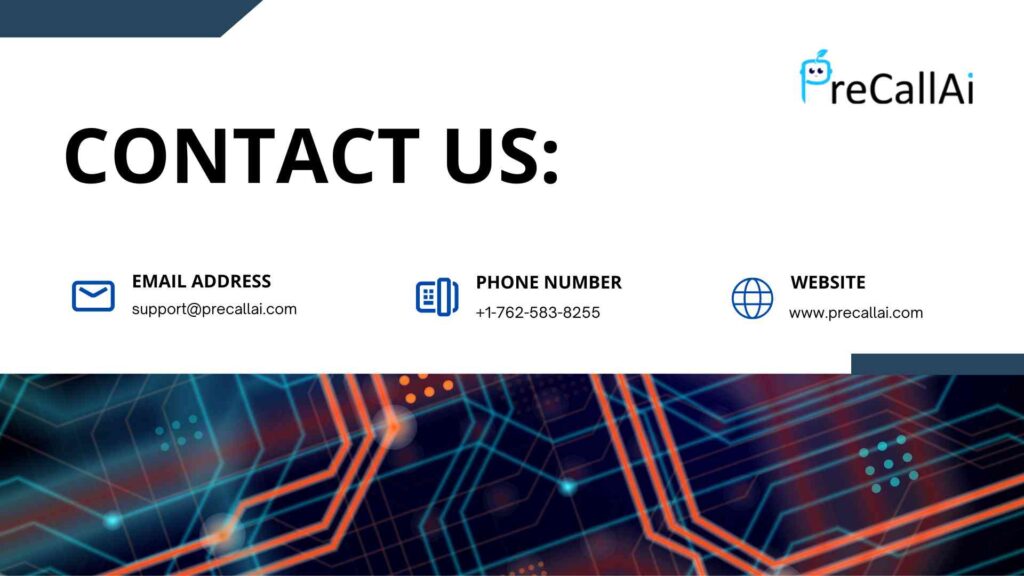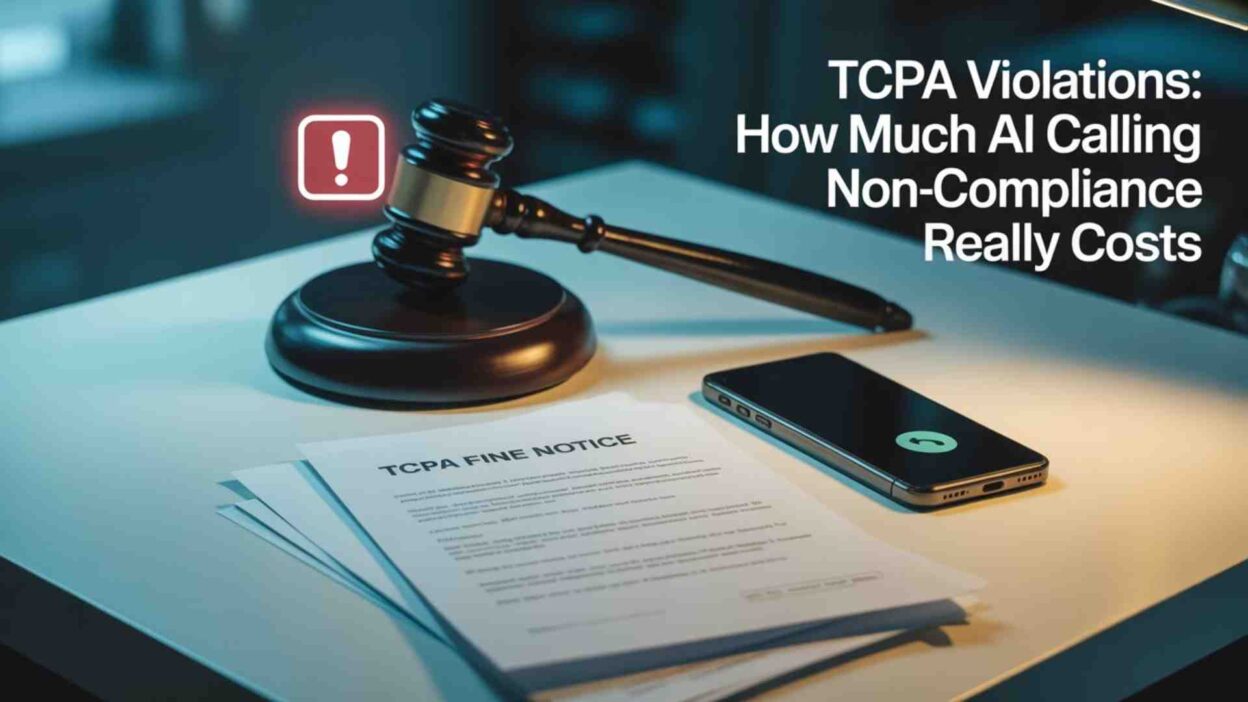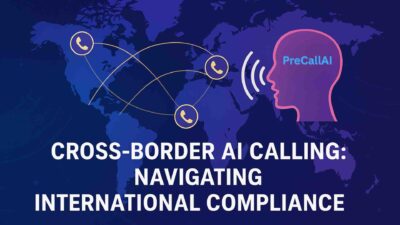TL;DR TCPA AI calling violations can destroy your business overnight. Voice bot legal penalties reach millions of dollars annually. Companies face lawsuits daily for improper AI calling practices.
Table of Contents
The Telephone Consumer Protection Act protects consumers from unwanted calls. AI calling systems must follow strict rules. Breaking these rules costs businesses enormous amounts of money.
Understanding TCPA AI Calling Violations
The TCPA regulates all automated calling systems. This includes AI voice bots and robocallers. Companies need written consent before making automated calls.
TCPA AI calling violations happen when businesses call without permission. Many companies don’t understand the complex consent requirements. Simple mistakes lead to expensive lawsuits.
Common TCPA Violation Scenarios
AI calling systems often violate TCPA rules accidentally. Calling cell phones without consent is illegal. Using pre-recorded messages requires specific permissions.
Voice bot legal penalties apply to all automated systems. This includes AI chatbots that make outbound calls. Even legitimate businesses face violations daily.
Companies call wrong numbers frequently. The TCPA holds businesses responsible for these mistakes. Previous consent doesn’t always protect companies from lawsuits.
Real Penalty Amounts for TCPA Violations
TCPA fines start at $500 per illegal call. Willful violations cost $1,500 per call. Large companies face millions in penalties annually.
Recent settlements show the true cost of violations. Dish Network paid $280 million for TCPA violations. Capital One settled for $75 million in 2022.
Voice bot legal penalties increase every year. Courts award higher damages to consumers. Class action lawsuits multiply the financial impact.
Financial Impact of AI Calling Non-Compliance
Direct Legal Costs
TCPA lawsuits are expensive to defend. Legal fees range from $50,000 to $500,000 per case. Settlement amounts often exceed $1 million for large violations.
Class action lawsuits create massive financial exposure. A single violation can affect thousands of consumers. Each person can claim up to $1,500 in damages.
Companies also pay regulatory fines to the FCC. These penalties are separate from consumer lawsuits. The FCC can fine companies millions of dollars.
Business Operations Impact
TCPA AI calling violations damage company’s reputation permanently. Customers lose trust in businesses that violate calling rules. Negative publicity affects sales and partnerships.
Insurance companies may refuse to cover TCPA claims. Business insurance policies often exclude communication violations. Companies pay all legal costs out of pocket.
Stock prices drop when TCPA violations become public. Shareholders file additional lawsuits against management. The financial damage spreads beyond direct penalties.
Long-term Business Consequences
Credit ratings suffer after major TCPA settlements. Banks reduce lending limits for affected companies. Higher interest rates increase operational costs significantly.
Voice bot legal penalties affect future business licensing. Some states restrict licenses for companies with violations. International expansion becomes more difficult.
Employee morale drops during lengthy legal battles. Key staff members often leave during investigations. Recruiting becomes harder with negative publicity.
Industries Most Affected by TCPA Violations
Healthcare and Medical Services
Healthcare companies use AI calling for appointment reminders. Patient consent requirements are complex and strict. Medical practices face frequent TCPA lawsuits.
Insurance companies call members about benefits regularly. Automated systems often lack proper consent documentation. Healthcare settlements average $10 million annually.
Pharmaceutical companies promote medications through calling campaigns. FDA and TCPA rules create double compliance requirements. Violation penalties multiply across regulatory agencies.
Financial Services Sector
Banks use AI calling for fraud alerts and notifications. TCPA AI calling violations occur when systems call without consent. Financial institutions face the highest penalty amounts.
Debt collection agencies rely heavily on automated calling. Consumer protection laws are extremely strict in this sector. Collection companies pay millions in TCPA settlements yearly.
Insurance companies call customers about policy updates. Automated systems often call expired phone numbers. Wrong number calls create significant legal exposure.
Retail and E-commerce
Online retailers use AI calling for order confirmations. Shopping cart abandonment calls require specific consent types. Retail companies face growing TCPA litigation.
Subscription services call customers about renewals automatically. Many companies assume existing relationships provide consent. This assumption leads to expensive violations.
Voice bot legal penalties hit small retailers particularly hard. Limited legal budgets make settlement the only option. Many small businesses close after major TCPA lawsuits.
How to Prevent TCPA AI Calling Violations
Implementing Proper Consent Systems
Written consent must be clear and specific. Consumers need to understand they’re agreeing to automated calls. Verbal consent requires detailed recording systems.
Consent forms should mention AI calling specifically. Generic permission statements don’t protect against TCPA claims. Legal language must be consumer-friendly and understandable.
Companies need consent management databases. These systems track permission dates and call preferences. Regular audits ensure consent records remain current and valid.
Technical Compliance Measures
AI calling systems need built-in compliance features. Automatic do-not-call list checking prevents violations. Call frequency limits reduce consumer complaints significantly.
Voice recognition technology should identify human responses. AI systems must transfer calls to humans when requested. Automated systems cannot ignore consumer opt-out requests.
Call recording systems must capture all interactions. These recordings provide evidence of compliance efforts. Proper documentation reduces lawsuit vulnerability substantially.
Staff Training and Oversight
Employees need regular TCPA compliance training. Staff members must understand consent requirements completely. Training programs should cover AI calling regulations specifically.
Management oversight prevents compliance failures. Regular system audits catch problems early. Compliance officers should monitor all automated calling activities.
TCPA AI calling violations often result from poor training. Staff members make assumptions about calling permissions. Comprehensive education programs reduce violation risks significantly.
Legal Defense Strategies for TCPA Claims
Documentation and Record Keeping
Proper consent documentation defeats most TCPA claims. Companies need detailed records of all permissions. Time stamps and IP addresses strengthen consent evidence.
Call logs must include compliance check results. These records show good faith efforts to follow rules. Courts consider documentation quality when determining penalties.
Voice bot legal penalties decrease with proper record keeping. Judges reward companies that demonstrate compliance efforts. Good documentation can reduce settlement amounts substantially.
Working with Specialized Legal Counsel
TCPA law is complex and changes frequently. General business lawyers lack specialized knowledge. TCPA experts understand industry-specific compliance requirements.
Early legal intervention prevents small problems from escalating. Lawyers can negotiate with plaintiffs before lawsuits develop. Proactive legal strategies reduce overall compliance costs.
Class action defense requires specialized experience. TCPA class actions follow specific procedural rules. Experienced lawyers can challenge class certification successfully.
Future of TCPA Compliance in AI Calling
Regulatory Changes and Updates
The FCC continues updating TCPA regulations regularly. New rules often affect AI calling systems significantly. Companies must monitor regulatory changes constantly.
State laws add additional compliance layers. California and Florida have strict calling regulations. Multi-state operations face complex compliance requirements.
TCPA AI calling violations will likely increase penalty amounts. Consumer advocacy groups push for higher damages. Future settlements may exceed current record amounts.
Technology Solutions for Compliance
AI technology can improve TCPA compliance significantly. Machine learning systems can identify risky calling patterns. Automated compliance tools reduce human error rates.
Blockchain technology may revolutionize consent management. Immutable records could prevent consent disputes. Smart contracts might automate compliance checking processes.
Voice bot legal penalties may decrease with better technology. Advanced AI systems can ensure perfect compliance. Investment in compliance technology pays long-term dividends.
Read More: Effective LinkedIn Connection Requests And Messages With AI
Conclusion

TCPA AI calling violations represent one of the most expensive compliance failures businesses face today. Voice bot legal penalties continue rising as courts award larger damages to consumers. Companies that ignore TCPA requirements risk financial destruction through massive settlements and legal fees.
The cost of compliance is minimal compared to violation penalties. Proper consent systems and staff training prevent most TCPA problems. Businesses must treat TCPA compliance as a critical operational requirement rather than an optional consideration.
Smart companies invest in compliance technology and legal expertise early. Proactive measures cost thousands, while violations cost millions. The choice between compliance and catastrophic financial loss should be obvious for every business using AI calling systems.





